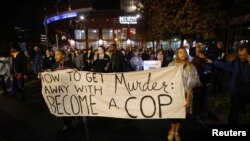A group of about 100 protesters gathered outside police headquarters in Charlotte, North Carolina on Wednesday night after a prosecutor announced no charges would be filed against the officer who shot and killed a black man in September.
The demonstration was peaceful, a contrast to the two days of riots following Keith Lamont Scott's death. Those protests resulted in the death of one person and dozens of injuries and arrests. North Carolina Governor Pat McCrory declared a state of emergency and city leaders instituted a nighttime curfew to restore order.
Some of Wednesday's protesters used the rally to highlight concerns about the use of force by police, particularly against minorities.
A lawyer for Scott's family expressed a similar sentiment shortly after the prosecutor announced no charges would be filed.
"That does not mean this officer's killing of Keith Scott was right. All that means is that under the view of the DA's office, it wasn't criminal. And those are two completely different things," said attorney Justin Bamberg.
Officer Brentley Vinson, who is also black, has said since the shooting that he was the one who shot Scott.
“I believe Officer Vinson acted lawfully,” District Attorney of Charlotte-Mecklenburg Andrew Murray announced Wednesday, saying that 15 prosecutors on the team voted unanimously in the case.
According to the official report released by the District Attorney’s office on Wednesday, Scott did not heed 10 calls to drop his weapon before an officer, also black, shot him four times.
The officer, Brentley Vinson, has admitted since the day of the altercation that he was the one who shot Scott, despite claims to the contrary, which Murray dismissed as erroneous.
Vinson was undercover investigating an unrelated case when he saw Scott filling an empty cigarillo with marijuana. Vinson and his partner were not concerned until they saw Scott holding a gun while sitting in his van, according to their testimony.
Surveillance footage of Scott from a convenience store he visited earlier that day shows a bulge on his ankle, bearing a striking resemblance to the gun and holster found at the scene.
The official report says Vinson then called for backup and followed Scott to the location of the shooting, where he asked him to step out of the car and drop his weapon.
District Attorney Murray did, however, confirm that all dash cam and body cam video from the scene does not show Scott's hands at the time of the shooting - making it impossible to confirm that he was threatening to shoot the officers.
Eyewitness testimony
Multiple people came forward, whether through social media or speaking to the press, to say they saw Scott unarmed, and that the item in his hand was actually a book. The District Attorney’s office said its investigation proved that many of these claims were false and officers found no book in the van or on site.
Scott’s widow had claimed multiple times throughout the investigation that he did not possess a firearm, but Murray said the probe found text messages between the two arguing about his gun.
Murray said that Officer Vinson faced a “reasonable” threat to act in self-defense.
Scott’s family has asked the community to remain peaceful if they protest.
“While we understand that many in the Charlotte area share our frustration and pain, we ask that everyone work together to fix the system that allowed this tragedy to happen in the first place,” a family statement said shortly after the decision was announced.
Scott’s death on September 20 triggered days of protests in North Carolina's largest city.
Two days of riots in the city, resulting in the death of one protester and dozens of injuries and arrests, lead then North Carolina governor Pat McCrory to declare a state of emergency. Despite a midnight curfew on the city in the week that followed, hundreds of peaceful demonstrators marched through uptown nightly.





